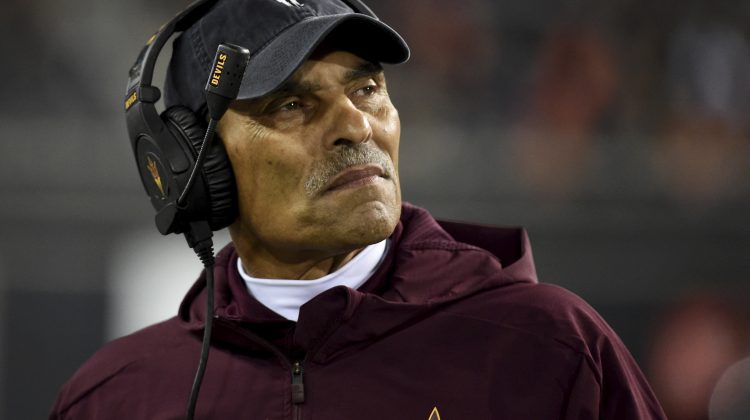It has been almost three years since Arizona State acknowledged an NCAA investigation into possible recruiting violations, 18 months since the school revealed a multi-million-dollar buyout of former coach Herm Edwards and one day since a published report indicated Edwards knowingly violated NCAA rules before reaching said separation agreement.
What a fiasco.
If you’re tracking at home, it sure looks like the university agreed to a separation deal with Edwards when it could have fired him with cause.
It certainly seems like ASU shelled out millions to a rule-breaking employee when it could have paid nothing.
Worst of all, it appears campus leadership abdicated all financial responsibility to students and staff, not to mention millions of state taxpayers.
The Sun Devils have danced to their own beat since hiring Edwards in the fall of 2017. But this, folks … this is next-level insanity.
Edwards delivered zero conference championships and no division titles during his five years on the job but managed to actively participate in a systematic eviscerating of NCAA recruiting rules during the COVID-era recruiting dead period.
We know this because he admitted to the violations and agreed to NCAA sanctions, according to a report Tuesday afternoon by SunDevilSource.
And yet, he was paid handsomely to step down as part of a “mutual separation agreement” in Sept. 2022.
We know this because the State Press reported a few weeks after that separation agreement that Edwards would receive up to half the amount remaining on his contract — or $4.4 million, according to a school spokesperson.
The two men with oversight of this dumpster fire were president Michael Crow and athletic director Ray Anderson.
Crow remains in charge of the university, doing both immense good for the campus writ large and immeasurable damage to the athletic department.
Anderson stepped down as athletic director in November and was given a cushy job, purportedly with full pay, as a professor of practice in ASU’s Sandra Day O’Connor College of Law.
Why did Crow and Anderson agree to compensate an employee who knowingly and repeatedly broke the rules? Every coaching contract in captivity includes sections on for-cause terminations.
Either they allowed Edwards to pocket more than $4 million when they could have fired him for nothing, or they agreed to the separation deal without knowing the facts of the case.
No matter how you slice it, they are guilty of fiscal mismanagement.
Did Anderson’s longtime friendship with Edwards influence the decision to cut a separation deal with favorable terms?
Why did Crow tell 98.7-FM, the school’s flagship radio station, in Feb. 2022 that Edwards was innocent? “These are things he did not ask them to do,” Crow said of the violations. “These are not things he was a part of.”
The Hotline reached out to ASU for comment early this morning, asking why the school didn’t fire Edwards for cause, what portion of the $4.4 million has been paid, how it was funded, and why Crow publicly stated that Edwards wasn’t part of the violations. Was he covering for Edwards or clueless about the details?
(Crow shouldn’t have been clueless, considering Yahoo’s initial report on the violations in June 2021 said the dossier of evidence against ASU included a picture of someone looking like Edwards escorting a recruit through the weight room during the NCAA dead period.)
We did not receive a response prior to publication.
The Hotline also sought comment from Cecilia Mata, the chair of the Arizona Board of Regents, which has oversight of the state’s three major public universities (ASU, NAU and Arizona).
Specifically, we asked if the regents would pursue the matter and ask Crow and Anderson to explain their decision to settle with Edwards.
Mata did not respond, but the board should do something. The situation demands real oversight and accountability.
Because if we cast aside the calamity that was the Edwards era, the deplorable violations during a public health crisis and the incompetent management of the football program, this situation is ultimately about the fiduciary obligations of a public institution.
The separation deal with Edwards was finalized in the fall of 2022. According to financial documents obtained by the Hotline, ASU’s athletic department received $18.5 million in subsidies that year:
— $1.9 million in direct state or other government support.
— $4.8 million in net direct institutional support.
(The gross amount was $11.2 million, but athletics transferred $6.4 million back to central campus.)
— $11.8 million in student fee allocation.
(The subsidies are an annual occurrence in Tempe and across the Pac-12.)
Yet even with all that help, the Sun Devils reported a $27.1 million shortfall on their 2022-23 statement of revenues and expenses submitted to the NCAA.
Remove the state and institutional subsidies, and the operating deficit soared to $45.6 million.
Seems like the $4.4 million handed over to Edwards could have been put to better use by the two professors of malpractice.
*** Send suggestions, comments and tips (confidentiality guaranteed) to pac12hotline@bayareanewsgroup.
*** Follow me on Twitter/X: @WilnerHotline
*** Pac-12 Hotline is not endorsed or sponsored by the Pac-12 Conference, and the views expressed herein do not necessarily reflect the views of the Conference.
Related posts:

(AP Photo/Marcio Jose Sanchez)
Hotline mailbag: Impact of the Comcast mess, options for Oregon and UW, Kliavkoff’s leadership, Pac-12 expansion options and more
(AP Photo/Ralph Freso, File)
Pac-12 media rights strategy: The market has spoken; time to cut a deal Hotline mailbag: Kliavkoff’s challenge, Scott’s role, Pac-12 expansion options and delays, the BYU piece, the Deion Sanders era and more
Hotline mailbag: Kliavkoff’s challenge, Scott’s role, Pac-12 expansion options and delays, the BYU piece, the Deion Sanders era and more
 Pac-12 media rights: Kliavkoff has made no secret about his strategy (and interest in streaming companies)
Pac-12 media rights: Kliavkoff has made no secret about his strategy (and interest in streaming companies)

